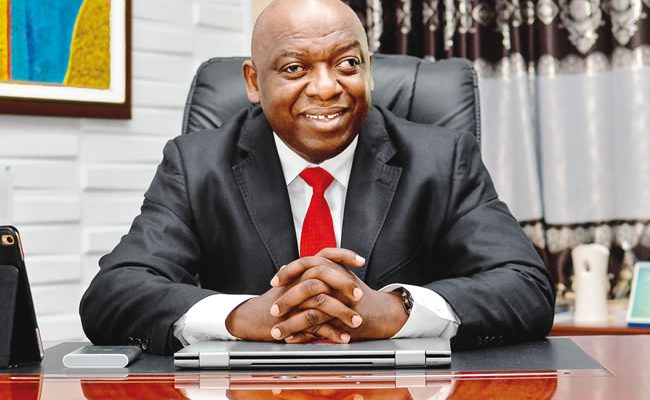Professor Joshua Ogunwole will be signing off as vice chancellor of Bowen University on July 31, 2023 after an impactful five-year tenure. In this interview, he speaks with LAOLU HAROLDS on the reforms he introduced, challenges and his expectations.
Five years ago when you took the helm of this institution, you set some goals for yourself to achieve. Looking back today, would you say you have achieved them?

To be candid, I thank God because over 95 percent of goals set have been achieved. I think there is only just one that I’ve not been able to (achieve). My desire was to build a zoo, so that any child here in Olupona, Ile-Igbo would have the opportunity to know what a zoo is like. Series of universities before usually would have a zoo; would have a planetarium, like a museum where plants grow. You’d have plant collections from all over the world, and so on. I’ve seen this in Germany and the US; I’ve seen this even in some African countries like Tunisia and so on. And I felt like this would have been something good here. Unfortunately, the council that I was responsible to didn’t buy that aspect of the idea. In fact, we had already got a donation of a baboon from the National Conservation Fund. That’s the only goal that we didn’t achieve.
Generally, people resist change. Here, you’ve been perceived as a no-nonsense chief executive. Were there some tough decisions you took along the line? And how did that pan out for you?
There were several tough decisions. If you want to transform, then you must take decisions that are a bit out of the usual box; and there are several tough decisions. The first thing we did when we came was to want to change the culture – the culture of coming late (to work), the culture of talking to students anyhow, the culture of dressing and so on. Right from the beginning, we had resistance and opposition, but naturally, you must set your face like a flint looking at your set goals. Several times, we kept talking, communicating, persuading and several things. And where we needed to use the hammer, we did; where we needed to use the carrot, we did. I remember that when we wanted to migrate from what was obtainable to what we are doing now, the modified collegiate system, several professors came out that it would not work: (saying) ‘we had done it in several universities, it didn’t work’ and I said no, it’s not collegiate; it’s ‘modified collegiate’. We modified it putting some of our challenges, our opportunities and even some of our threats into consideration. The rest is history now. Above all was when we had to lay off over a hundred (members of) staff. I think that was the most challenging one; it was one of the dark moments for the university, but we had to do it. Normally, there is no one who wants to bring a desired positive change that would not have resistance and opposition; but despite the resistance and opposition, the most important thing is getting to the desired goal.

You’ve said it several times that we cannot run public schools like private schools are run. Can you expatiate on this?
The way the public university is set up now, there is no way any private would want to copy it in toto and be sustainable. Public universities may afford to spend money anyhow. One, they don’t pay salaries; Abuja pays their salaries. So, all their IGR (internally generated revenue) they can use anyhow. They may not fund research because TETFund has already put money aside for any university for research, even though whatever TETFund is putting is money for minimal research. So, there is a lot of money to play around with. However, the private university is the one that pays the salary from its IGR. It’s the one that looks for money for research; no TETFund for it. It’s the one that looks for money for training of its staff, and so on. It must keep supporting the students when it wants to go and do competition outside, because that’s the way it can lift the brand of the school. So, leadership of such institutions must need to be frugal and maintain fiscal discipline. Aside from the fiscal aspect, the public university may not bother about its image per se, because whether there is image laundering or not, students will come. But the private universities cannot be like that; you must keep boosting your profile so that you can have acceptable image and brand name – and these things cost! For instance, between 2017 and today, Bowen has spent over N300 million on building the brand. These are things that public universities don’t necessarily have to do. So, you cannot now want to run a private university and copy the public university method, structure and system; you would run the private university aground. That’s why you would never hear us have a ‘head of department’ because in a public university setup, you have a head of department, he must have a secretary, he must have a clerk or somebody who dispatches, and maybe a messenger; and you must have a special office for him. We threw away all that and said we only have programme coordinators. BSc Mathematics is a programme. Somebody coordinates that. Of course he uses his office, but he is not a head of department; he’s a coordinator of the programme. So, with that we’ve been able to reduce our overhead tremendously. That’s why we are saying that you cannot use the template of public university to run a private university.
There was a time Nigerian universities introduced entrepreneurial education. You’ve said several times that the kind of entrepreneurial education they introduced was not effective. What kind are you suggesting or running at Bowen University?
At the university level, you cannot be talking about entrepreneurship and you’re buying sewing machines and whatever. Do that to them at the secondary school or primary school, but at this (tertiary) level, you want to raise entrepreneurs who affect the world; who would have global impact, who would have national relevance. What we are saying is this: teach the students under entrepreneurship how to (conceive) an idea, work on the idea to be an innovation, and take all the processes so that they can either commercialise it, start up a company with it or whatever. That’s how we see great minds work all over the world. A university should not be talking about entrepreneurship in the context of wanting to (have students) learn confectionery or become mechanics; universities should be beyond all that. For instance, there is this adhesive plaster they use. When this adhesive plaster spends a long time on your skin and you want to remove it, you feel pain because some of your hair is pulled off. A student can say how can I make a plaster that can stay that long and not have that effect on the person? That’s an idea. He can keep working on that idea and innovate with it. The student may not have money; he may have to go and look for investors – whether they are angel investors or venture capitalists. Those are the kinds of things we teach in SIWES. Today in Bowen University, some of our students are doing business. Several of our graduates out there are not looking for jobs. I have a graduate that is out there making just perfume, customized perfume. He’s not even selling again in the country; he’s exporting. His business is worth over USD10 million. There is a student that graduated two years ago. He was among the three that led Bowen to have a competition on programming. Bowen came first among all the universities in the country at the National Mathematical Centre. He’s now in Oxford.
Private universities are springing up today at a dizzying pace. What is the uniqueness of Bowen in all this? What is your niche?
The uniqueness of Bowen is that we inter-mix godliness with learning. We ensure that it’s not just by speech; we develop character in our students even as they learn. We cause them to take the name Christ with them as they move along. We prepare them to be leaders who will influence their future; so, they are bold to speak out. They are bold to look at any programme either of government, community and so on and offer critique and solutions. We also ensure that our students are into public debates. It’s one of the things we promote in our students; and that’s why everywhere there is public speaking competition, we are either first or second. Another thing is the area of entrepreneurship. We also allow our students on their own to do SIWES at places where you they can get maximum benefit. Like we introduce them to KPMG to go do SIWES; we introduce them to Nigerian Flour Mills and other specific places that we see as Blue Chip companies to do SIWES. Those are the uniqueness of Bowen. Another thing is we introduced what we called the Mediated Reading Plan (MRP) to boost the reading culture of our students. How do we do it? We published that in The Punch of 25th of July, 2019 because we felt other universities should be able to pick the idea. And we started with Jim Ovia’s book ‘African Rise and Shine’. Why we picked that book is that it has a bearing on entrepreneurship and how he started Zenith Bank. We call students to read it, two chapters every day, and discuss it. I think about half the students have read the book.
You introduced the One-Day Student Vice Chancellor. Why did you introduce this?
I mentioned earlier that we develop our students to be leaders that will affect their future. It’s part of helping them to take their destiny in their hands in the area of leadership. One, what qualifies you to be a one-day vice chancellor? You write an essay; there are book readings that you will do, you make presentation and answer questions, then finally, you go to campaign. And of course, there is a minimum CGPA you must maintain; I think it’s 3.5, below which you cannot apply. Those are the things we put in place so that we can keep developing that aspect of leadership in our students.
Despite several advocacies, TETFund interventions have still not been extended to private universities. What’s your take on this?
Private universities will never benefit from TETFund until the Act of TETFund is reviewed. No matter what anybody says, the Act establishing TETFund does not support it. The first thing we need to do as Committee of Vice Chancellors, Committee of Pro-chancellors and chancellors of private universities is to actually do a strong advocacy so that the Act will be reviewed to accommodate private universities, knowing that they are also making contributions; they are paying tax, which is part of what TETFund is getting. They are employers of labour, helping the country to reduce unemployment, and also helping to boost the economy of the country.
Looking at the Nigerian university system entirely in relation to the quality of its products. What can you say about the products being produced by the system?
I hear such talks about quality of products and what have you, and many times I ask: who set the standard? Is it the European standard or world standard? The most important I feel is that the university is a place where you need to open up the students to want to acquire any kind of knowledge. Once you’ve been able to achieve that, and that student/person has a quest for knowledge and is getting what he/she wants at any point in time, then you have helped that person to develop himself for life. I frown personally on saying that this is how the curriculum should be across; I don’t believe in that. Bring quality people who should come and discuss their work with students. For instance, if I bring Professor Wole Soyinka today, which syllabus do I want to give Wole Soyinka to teach literature? Wole Soyinka himself is a syllabus in the university. What universities ought to begin to do is to attract great minds to come over. When you have that, and you have students rubbing minds with them, that’s when you have top students.
What’s the secret of your success?
It’s God. It’s not just saying it for saying sake; we get our inspiration from the Holy Spirit. We prayerfully meditate in the word of God and we get directions. (the Bible) says ‘the entrance of Your word gives light and understanding to the simple’, and it’s true. The more of the word of God you digest, the more inspiration you get (that’s the light); you’d have the understanding on how to run it. That has been our driving force in the course of these past five years.
You’ve already taken the university to an enviable height, and someone else is about to take the baton from you. In the next five years, what would you like to see here?
You mean at Bowen?
Yes.
In the next five years I see a Bowen where every scholar all over the world comes, spends three months, one year, some even staying here to work. I see that happening in the next five years. They will come from Australia, diversity of colour, speech, culture and so on; and so students too (will) come from all over the world. It’s possible. In the next five years, I want to see a Bowen that would be more solution-base to national and regional issues than any other thing; a Bowen that is already on the hill and there is no way anybody can hide it, in terms of research, in terms of community service and what have you.
READ ALSO FROM NIGERIAN TRIBUNE







